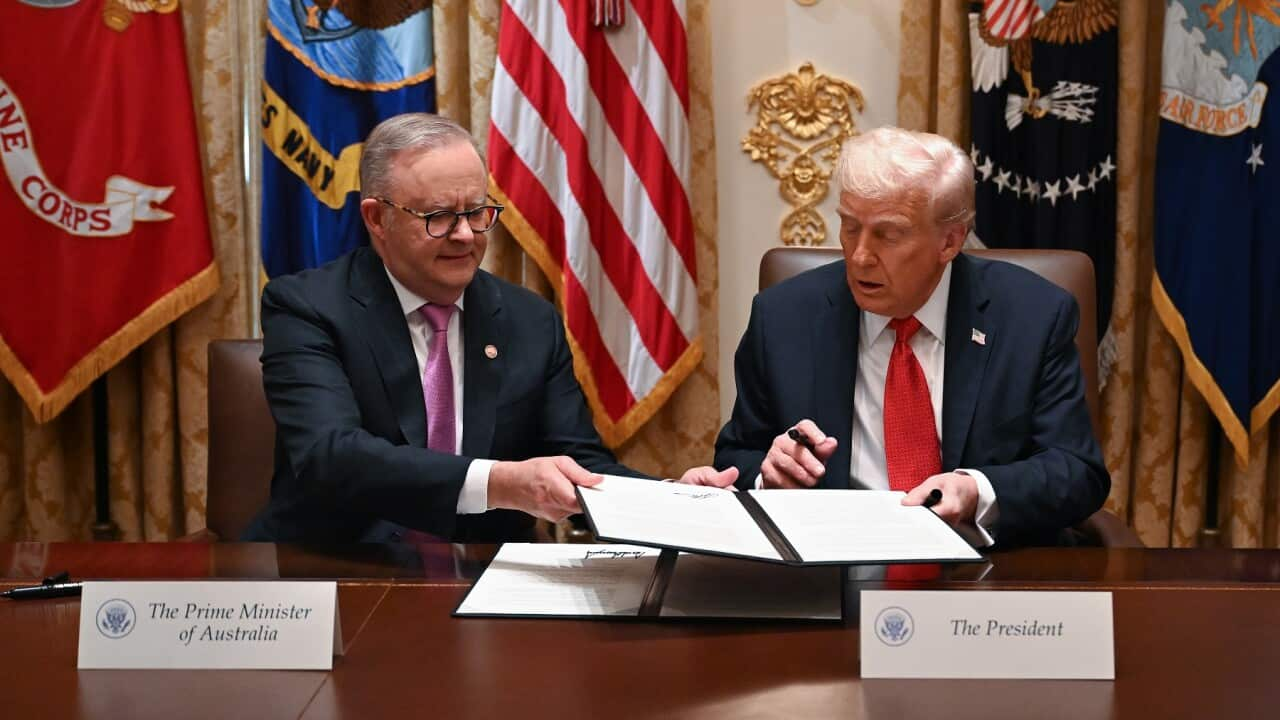Listen to Australian and world news, and follow trending topics with SBS News Podcasts.
TRANSCRIPT
An apology from the company behind the recalled Japanese health supplements linked to deaths and hospitalisations.
Akihiro Kobayashi is the president of Kobayashi Pharmaceutical Company.
"We deeply apologise for causing pain and anxiety to many people due to the issues of kidney diseases caused by ingesting our product “benikoji (red yeast rice)," which developed into a social issue."
In what is believed to the first major recall of a domestically-produced supplement, the company last week - 22 March issued a voluntary product recall for three product lines of health supplements.
But as early as mid-January, the company had received reports - including from doctors - that people who had taken the products had been hospitalised with kidney problems.
Mr Kobayashi says the company followed company guidelines and legal advice before issuing its product recall, but says in hindsight the company should have acted sooner.
"We are doing our best to elucidate the full scope of the situation, prevent further damages and investigate the causes of it and provide sincere responses to customers, including detailed explanations and guarantees, and improve the quality control system, listening carefully to the experts’ insights."
Marketed as lowering cholesterol levels, the supplements contain an ingredient called "beni koji" - a rice fermented with red yeast that is traditionally used in Japan in food seasoning and preservation, as well as in rice wine production.
Scientists say the fermentation process involves the risk of producing unsafe levels of citrinin - a toxin that causes kidney dysfunction.
The Kobayashi Pharmaceutical Company says a preliminary investigation has not detected any citrinin, but it did identify an unintended substance in a batch of products called "puberulic acid" that can be produced from blue mould.
It says it is unclear what effect the substance has on the human body.
So far, the company says it has responded to about 30 per cent of the numerous inquires it has received from concerned consumers.
The health ministry has also set up an emergency hotline.
The ministry urged people, especially those with weak kidneys, to avoid beni-koji.
It says recalls have been issued for 40 more products from other companies containing beni-koji, including: miso paste, crackers, sake, bread and a vinegar dressing.
These consumers say they are worried.
"I don't take Kobayashi Pharmaceutical products, but I take other health supplements and I am very worried about whether there are any problems with these products."
"How did this incident happen and what measures will be taken? These issues require a comprehensive explanation from the government."
Health officials have raided the Osaka factory where batches of the recalled products were made.
The products have also been exported to countries - including Taiwan and Singapore - where further recalls have been issued.
Japan's chief cabinet secretary, Yoshimasa Hayashi, says the government is also working with agencies globally to alert consumers who may have purchased the affected products.
"We are providing information of the initiatives that the government is undertaking and what we have obtained from it to World Health Organisation and foreign governments - through channels for disaster exchanges. We will continue to inform foreign countries in a timely and appropriate manner; and strive to ensure trust in Japanese food products."
He says the government will conduct an investigation and analysis of Kobayashi Pharmaceutical Company and its products.
Safety inspections have also been ordered for nearly 6,800 types of products coming under the same labelling and regulatory system that applied to the recalled beni-koji products.
Some regulators say changes in 2015 weakened the control measures in place, and they say tougher standards are needed, particularly when it comes to advertising claims on product benefits and side effects.
Professor Atsushi Osanai at Waseda University says steps need to be taken to restore confidence in the approvals process.
"The Osaka plant involved in the case has halted its production… As a pharmaceutical company such problems caused by the production of food and oral products underlie problems in its crisis management. These supplements do not require official approval and enterprises may label their products based on their reputation. Strict safety management by enterprises is the premise of this system. This incident has damaged people's trust in the whole system."
The government has ordered a review of the regulatory system, with a report due in May.













